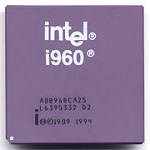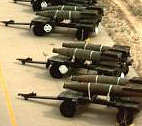 Jeffrey Lewis, who works at a DC think tank and who blogs at Arms Control Wonk, took issue with our post on the Sudarshan indictment. Unfortunately, it doesn’t appear that either he or Scott Gearity, whom he quotes, bothered to read what we said very carefully:
Jeffrey Lewis, who works at a DC think tank and who blogs at Arms Control Wonk, took issue with our post on the Sudarshan indictment. Unfortunately, it doesn’t appear that either he or Scott Gearity, whom he quotes, bothered to read what we said very carefully:
Clif Burns at export law blog [sic] suggests one of the microprocessors—the i960—in the second half of the indictment isn’t controlled, noting that its out of production and obsolete.
I asked our old friend Scott Gearity if the i960 microprocessor was controlled. Scott pointed to “a couple red herrings in Burns’ analysis—(1) just because something is no longer being manufactured doesn’t mean its no longer … potentially subject to the ITAR (don’t export that surplus B-52 without asking State first) and (2) a term like “off-the-shelf†obfuscates the main issue, which is whether an item as been specially designed, developed, configured, adapted or modified for a military application.â€
To begin with, we never said (nor would we say) that something that is no longer being manufactured isn’t subject to the ITAR. What we said was simple. The i960 processor came in a military version — the i960MX — and non-military versions that were used in telecommunications and other applications, including slot machines. The i960MX would clearly be an ITAR component, but we didn’t think the i960MX was being exported. The fact that it wasn’t being manufactured suggested that it wasn’t being exported, not that it wasn’t on the USML.
Nor does “off-the-shelf” obfuscate anything here. Apparently Lewis and Gearity think that if you test an item in normal commercial use to military specifications, it may transform that off-the-shelf item into a USML item.
I’d say its an unsettled issue as to whether general purpose microprocessors tested to a military standard are subject to the ITAR. The definition of a “defense article†is silent on items tested to military standards.
The fact that the definition of defense article is silent on this point would more likely suggest that simple testing won’t transform a normal commercial item into a defense article.
Say you make 100 chips, all of identical design, materials, etc., but when you test them only 90 meet the military QA standards (for reliability or whatnot). Are those 90 defense articles? All 100? I think you could argue that none of them are, but that’s a more aggressive approach then I would recommend to a client without first obtaining a written opinion from State.
I don’t think the argument that none of them are defense articles is aggressive. Let’s do something that neither Gearity nor Lewis may have done. Let’s actually take a look at the relevant provision of the ITAR: subsection (c) of Category XI – Military Electronics. Subsection (c) states that the following items are included on the USML:
Components, parts, accessories, attachments and associated equipment specifically designed or modified for use with the equipment in paragraphs (a) and (b) of this category, except for such items as are in normal commercial use.
Simply put, testing a microprocessor isn’t designing it or modifying it for a military use. The item is the same thing both before and after the testing, and it either was or wasn’t designed or modified for military use. Furthermore, the explicit exception here of “such items as are in normal commercial use” underlines my point that an off-the-shelf item doesn’t become ITAR-controlled just because it’s been tested to see if it also meets some particular military specification.
Even if testing a normal commercial item won’t turn the item into an ITAR-controlled item, it may well pose another problem under the ITAR. Testing that component to a specification provided by a foreign military is almost certainly a defense service under ITAR § 120.9 if the item is to be integrated into a defense article, as was the case here. Accordingly, such testing would require DDTC authorization. That, however, wasn’t charged in the indictment.

 Posted by
Posted by  Category:
Category: 

 A short round-up of current export items that don’t merit their own posts:
A short round-up of current export items that don’t merit their own posts:

